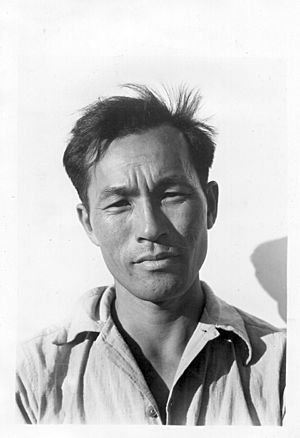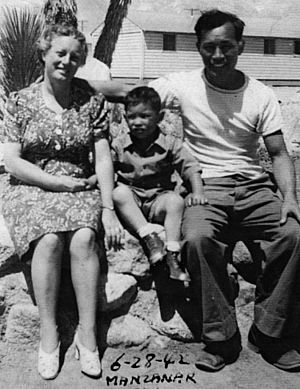Karl Yoneda facts for kids
Quick facts for kids
Karl Yoneda
|
|
|---|---|
| 米田剛三 | |

At Manzanar internment camp, 1942
(Photo: Dorothea Lange) |
|
| Born |
Goso Yoneda
July 15, 1906 Glendale, California, U.S.
|
| Died | May 8, 1999 (aged 92) |
| Known for | International Longshore and Warehouse Union Communist Party organizer |
| Spouse(s) | |
Karl Gozo Yoneda was a brave Japanese American activist. He worked hard to organize unions and was a veteran of World War II. He also wrote books. Karl Yoneda helped start the International Longshore and Warehouse Union. He lived from July 15, 1906, to May 8, 1999.
Contents
Karl Yoneda's Early Life
Karl Yoneda was born in Glendale, California, in 1906. His parents, Hideo and Kazu, were immigrants from Japan. In 1913, his father became sick. The family moved back to their village near Hiroshima, Japan. Karl's father passed away two years later. His mother then raised Karl and his two sisters.
After World War I, Karl went to high school in Hiroshima. When he was 15, he organized a strike. This was among newspaper delivery boys for the Chugoku Shimbun. The company had made their delivery routes longer. But they did not pay the boys more money.
These experiences made Karl think about fairness. He started reading books by thinkers like Karl Marx and Engels. When he was 16, he traveled to Beijing. He met a blind anarchist poet named Vasili Eroshenko. Karl stayed with Eroshenko for two months. After returning to Japan, he joined workers' strikes. He also started a journal for poor farmers called Tsuchi. Because of this, he was beaten and put in jail.
Activism in the United States
In 1926, Karl Yoneda returned to the U.S. He did not want to join the Japanese army. Even though he was an American citizen, he was held for two months. This happened at the Immigration Detention House on Angel Island in San Francisco Bay.
He changed his first name to Karl to honor Karl Marx. He worked in Los Angeles washing dishes and windows. He earned $5 a day. Karl joined the Communist Party and the Los Angeles Japanese Workers Association. He later wrote about this time:
I was a young dreamer back then, you know, the utopian type. The Plaza was my very first experience with mass demonstrations. It was easy to go over there because you felt like you were with your own kind of people—no dressed-up people there, nobody was wearing neckties.
In 1929, Japan invaded China. Karl went back to Japan to protest this invasion. He marched with strong protest groups. He almost got arrested but returned to the U.S. safely.
In 1931, Karl was at a march in Los Angeles. The police "Red Squad" badly beat him. They threw him in a jail cell. The police chief called Elaine Black Yoneda. The police called her the "Red Angel." She helped strikers. Elaine quickly bailed Karl out and took him to a hospital. This saved his life. Karl and Elaine soon fell in love.
They could not get married in California. This was because of Anti-miscegenation laws. These laws stopped people of different races from marrying. So, they borrowed money and went to Seattle. They got married there in 1935.
They took part in some of the biggest protests in the city's history. In 1933, Karl spoke to the L.A. City Council. He spoke against the "Red Squad's" unfair actions. Later, the squad caught him and beat him severely. This was the worst beating of his life. Karl took three months to recover. During this time, Elaine went to San Francisco. She worked for a group called the International Labor Defense. Karl was offered a job editing a Japanese Communist newspaper, Rodo Shimbun. He moved to San Francisco to take this job.
In May 1934, Karl and Elaine helped organize a longshoremen's strike in San Francisco. Longshoremen are workers who load and unload ships. The bosses and police wanted to stop the strike. They shot at the strikers. Two people were killed, and many were hurt. In 1938, Karl went to Washington State. He helped organize workers in Alaska's fish canneries.
World War II and Later Life
In 1942, Karl, Elaine, and their son Tom were sent to Manzanar. This was an internment camp. They were unjustly held there because of Executive Order 9066. This order forced many Japanese Americans into camps during World War II. Karl signed up for the draft and joined the army in November. He served in the United States Military Intelligence Service. He worked as a Japanese language expert in China, Burma, and India. He served bravely and received several awards.
After the war, Elaine and Karl continued their work. They supported unions and worked for peace. Karl's mother had survived the atomic bomb in Hiroshima. In 1960, Karl and Elaine visited her. They were also attending a peace conference in Tokyo.
Karl retired in 1972. But he kept working for human rights. He gave speeches, wrote articles, and wrote his autobiography. He remained a member of the Communist Party. His wife, Elaine, passed away in 1988. Karl Yoneda died on May 8, 1999.
See also
- Japanese resistance to the Empire of Japan (1937–1945)
- Koji Ariyoshi
- Elaine Black Yoneda
 | George Robert Carruthers |
 | Patricia Bath |
 | Jan Ernst Matzeliger |
 | Alexander Miles |


